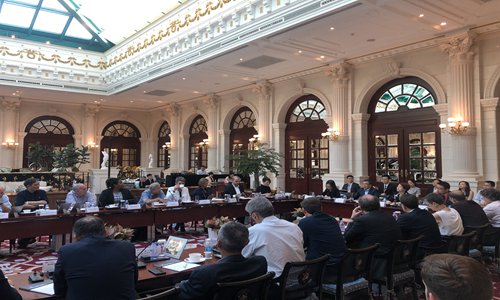Huawei vows to fix ‘loopholes’ in building ecosystem in 2-3 years: chairman
By Fan Lingzhi in Shenzhen Source:Global Times Published: 2019/9/24 23:48:40
Huawei vows to fix ‘loopholes’ in building ecosystem in 2-3 years

A meeting attended by domestic and foreign media representatives at the China-Germany-US Media Forum co-organized by the Global Times and the Robert Bosch Stiftung, or Robert Bosch Foundation, on Tuesday in Shenzhen Photo: Fan Lingzhi/GT
Huawei will spend two to three years to fix "loopholes," or dependence, in construction of its operation system and open ecosystem, the Chinese tech giant said Tuesday.The "loopholes" in the information and communications technology sector have already been fixed, meaning supply to that sector is no problem, Huawei Chairman Liang Hua told a meeting attended by domestic and foreign media representatives amid the China-Germany-US Media Forum co-organized by the Global Times and the Robert Bosch Stiftung, or Robert Bosch Foundation, on Tuesday in Shenzhen, South China's Guangdong Province, where Huawei is headquartered.
Liang told them that so far the company was operating normally and "the US ban has no real impact on Huawei's operation."
US President Donald Trump said at the G20 summit in June that US companies could sell their equipment to Huawei as long as transactions do not present a great national emergency problem. This was widely seen as a U-turn after the US government blacklisted Huawei in May for "national security" reasons.
However, the US government has not yet delivered on its promise.
Since the US ban, Huawei has been ramping up efforts to attract more developers in a bid to build its own systems, which will cost an investment of another $1.5 billion.
As a backup, Huawei launched Harmony OS in August after Google followed the US government's instruction in May to partially limit the Chinese company's access to Android.
"If the US government allows, Huawei still hopes that it can provide services for global consumers by using Android products," Liang said.
During the Huawei Connect 2019, a flagship annual event in Shanghai last week, Huawei Deputy Chairman Ken Hu Houkun reiterated that the company will seek to attract more developers in its future computing strategy, which will become the focus of its development path.
Liang also noted during the meeting that Huawei is serious about its proposal to "transfer" its 5G technology to US firms.
"If Huawei can serve the US market or global market, and a reasonable and fair competitor emerges, it will help prevent Huawei from being slack and then become more competitive," Liang said.
The Chinese government clarified at the beginning of this year that it did not require enterprises to install a "backdoor" or collect foreign information, said Liang, when asked about the issue.
"For the past years, we've never received such requirement. Even if we received one someday in the future, Huawei would never execute."
During the meeting, the Global Times Editor-in-Chief Hu Xijin inquired on Liang's view that the outside world did not believe the US ban had little impact on Huawei and also doubted the company was unaffected by the Chinese government.
"Foreign media at the site might not believe that faced with a US crackdown, Huawei is little impacted," Hu said. "They also don't believe that Huawei stands independent from the government."
Such distrust cannot be erased in an instant, Liang replied, and the issue needed more communication.
"I'm not an expert on Huawei while and I didn't know that much about it. I didn't find it mysterious. You know it's pretty clear what they do and what they wanna do," Nicholas Goldberg, an editorial page editor at the Los Angeles Times, told the Global Times.
Goldberg said he was trying to seek his own answers about Huawei against reports in the US that the company was "spying on the US."
Christian Haenel, senior vice president of Robert Bosch Stiftung, told the Global Times Tuesday that his first visit to Huawei headquarters impressed him.
"The scale of the headquarters, the expertise of Huawei's employees as well as the smart city exhibition hall have all left a deep impression for me," Haenel said.
"Today has marked a good beginning to build trust between China, Germany and the US. It is a very good opportunity to build an equal dialogue platform and to cultivate trust, the way of which should be maintained in the future,"he said.
Newspaper headline: Huawei vows to fix ‘loopholes’ in building ecosystem in 2-3 years
RELATED ARTICLES: